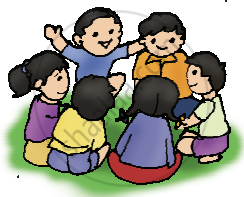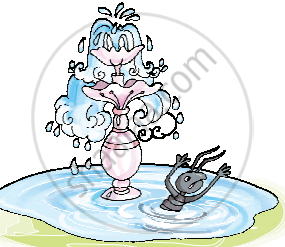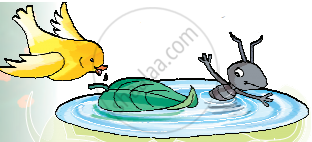Advertisements
Advertisements
Question
Based on your understanding of the play, explain how a mistaken understanding of events can lead to confusion. How has the author used this unexpected combination of events in the situation to create humour?
Solution
Author C.V. Burgess is a master craftsman. He reveals only a few names. The first patient Joe and his wife Emily are the most dominant characters. Joe is inside the surgical room. Emily is apprehensive about their husband. Among two children the dramatist uses only the girl’s name Dorothea and the Dentist hospital becomes a play area for Dorothea and the little boy who claim the same magazine for reading. The snobbish woman who goes on showing her
photo album gives us an impression if she came to see the doctor or to show her photos. The whole play revolves around the dramatic irony of patients’ guess as to what happened inside the dentists’ room and what really happened. The pliers, hack saw and the huge hammer were taken inside the dentist’s room only for opening the tool cabinet. But the patients wondered how these tools would be used in surgery. The groaning noise from inside the dentist’s rooms and the vexation of Emily Joe add to the dramatic irony. A few women patients leave the waiting room scared of subjecting themselves to the torture of having their bad teeth extracted with carpentry tools. The nurse moves about with all feigned seriousness without disclosing the fact of the misplacement of the key which adds to the comic situation
APPEARS IN
RELATED QUESTIONS
Listen to the passage about Nammazhwar, an environmental crusader from Tamil Nadu. As you listen, answer the following question. The listening act can be repeated if required.
What was the turning point in the life of Nammazhwar?
Without trust, there is no ______.
When people betray you learn from the ______.
What is the humble request of the twelve- year -old to the elders?
The dream of Severn Suzuki is ______.
There are often a lot of problems with mobile phones.
Santhiya always talks on her mobile to her friends.
How did Santhiya solve the problem?
Mobile phones often _________ at the wrong moment.
Raj’s pain of not doing well in his test was compared with ______ of pencils.
Madhubani paintings were originally done on ______.
The health of a bird can be determined ______.
Announcement 1
When will the regular boarding begin?
Announcement 2
For whom is the final boarding call?
Announcement 2
Where is the flight to?
Listen to the passage carefully and write the answer.
Who approached the scientist?
The daughter is going to cook the fish.
Whose speech is this?
Some of the negative effects of a mobile phone are:
(a) __________________
(b) __________________
(c) __________________
(d) __________________
Choose the correct one after listening the movie clip.
Bart wants to help his mom.
Choose the correct one after listening the movie clip.
Bart’s mother wants him to make tomato sauce.
Listen to the audio and answer the following.
Why did Jacklin invite Shabeena to her house?
- To study
- to play
Listen to the following paragraph.
|
The Ant and the Dove On his way home, an ant saw a sparkling fountain. He crawled onto its wall to take a closer look.
Suddenly he slipped and fell into the water. He gurgled and panicked and waved his legs in the air. “Help! I can't swim,” he cried. Luckily, just at that moment, a friendly dove flew by. She saw that the tiny ant was drowning and quickly flew to a nearby tree. She pulled off a leaf and let it glide down to the ant. “Here you are,” she cooed and flew away.
(Adapted from Aesop’s Fables) |
- Why do you think the dove helped the ant?
- How do you think the ant felt on finding the leaf?
- Have you ever been in trouble like the ant? Did anyone help you?
Listen to the audio and choose true or false.
You can’t hold the pencil hard.
Form a circle and whisper a secret into the ear of the person on your right. He in turn whispers into the ear of the person on the right. Pass the secret on till it goes around the circle. The last person will tell the secret aloud. Is the secret the same as what the first child had whispered?

Listen to the words
Come in, come in Go out, go out
What word signs have you seen or heard –
| at home | |
| at the vegetable shop | |
| at the library | |
| at the doctor’s place | |
| at the bus stop | |
| at the toy shop |
Also find out how people sent messages in olden days and how they send them nowadays.
Listening Activity
First, read the questions given below. Next, listen to an excerpt from a poem read out by your teacher or played in a recorder. Note how a child admires and praises the abilities of his/her father. Then tick the right answers from the options given.
by Edgar Albert Guest
My father knows the proper way
The nation should be run;
He tells us, children, every day
Just what should now be done?
He knows the way to fix the trusts,
He has a simple plan;
But if the furnace needs repairs,
We have to hire a man.
My father, in a day or two
Could land big thieves in jail;
There’s nothing that he cannot do,
He knows no word like “fail.”
‘Our confidence” he would restore
Of that there is no doubt;
But if there is a chair to mend,
We have to send it out.
In conversation, father can
Do many wondrous things;
He’s built upon a wiser plan
Then presidents or kings.
He knows the ins and outs of each
And every deep transaction;
We look to him for theories,
But look to ma for action
i) When the ______ needs to be repaired, they have to hire a man.
- heater
- furnace
- stove
- oven
ii) Father knows no word like______
- fail
- frail
- jail
- snail
iii) It is certain that the father would restore the _______of the family members.
- glory
- prosperity
- confidence
- happiness
iv) The father will not be able to mend a broken
- table
- bench
- chair
- stool
v) The children expect their _________ to guide them in action.
- mother
- father
- teacher
- guardian
First, read the question given below, then listen to the poem, read aloud by the teacher, or played on an audio player. Then answer the question based on your listening of the poem.
Midnight Wonders
I was tossing in my bed in the midnight hour, struggling to get a wink of sleep, but my eyes lay on the clock tower.
I looked upon the dark sky; it was adorned with sparkling pearls, which giggled at me and put a shine to my curls.
I gazed at the chubby moon, which was white and glistening like milk. Gave me a lovely, motherly smile through her lips as rosy pink.
All these magnificent objects made my mind calm. My eyelids started drooping. I was grateful for their wonderful charm.
Nature had arrived to aid me when I was trying to catch sleep. She, with her caring palms, lulled me to slumber, so deep.
1. The poet was tossing in the bed awake because ______
- he was worried
- he was struggling to sleep
- it was daytime
- he was tired
2. The ______were ‘sparkling as pearls’.
- moon
- sun
- stars
- meteoroids
3. The ______gave the poet a motherly smile.
- sun
- stars
- moon
- sky
4. ______made the poet’s eyelids droop.
- nature
- rosy lips
- songs
- tiredness
5. ______is the title of the poem.
- Wonders
- Midnight Wonders
- Nature
- Midnight dreams
First, read the following statements. Then, listen to the passage read aloud by your teacher or played on the recorder and complete the statements. You may listen to it again, if required.
There are many answers to this question. Firstly, 1 would say that we owed much to the work of previous climbers on Everest: to the experience and know ledge they passed on, and to the fact that they had gone on trying and had never given up hope.
Next, I w ould place the careful and thorough planning done before the climb began. On the Everest, a large number of people have to do different things in different places at the same time. Unless every detail had been worked out in advance, things would quickly have gone wrong.
The third reason was the excellence of our equipment. In particular, our oxygen apparatus was very important, and it worked well. Without it. we could not have reached the summit.
Our own fitness played a big part in the climb, and this was due to our periods of training, in which we got used gradually to great heights: and to our food; and to the care and attention we received from our doctors.
Above all else, I should like to mention how well we worked together. That was the biggest single reason why we got to the top. In the four months we were together we lived and worked as a team. Not everyone could climb to the top. Some of the members had jobs to do on other parts of the mountain; jobs that were less exciting than climbing to the summit, but just as dangerous and uncomfortable. But everyone played his part to the full. That was the biggest thing of all.
In the same way, our Sherpas were magnificent. Without our tents, our oxygen, our food, our climbing gear, the summit could not have been reached. And without the Sherpas, we could
not have lifted all this equipment, which weighed 750 lb., up to 26,000 feet, ready for the assaults. No praise is too high for these cheerful and
gallant men.
Finally, there was the weather. For five weeks we had bad weather; then, after the middle of May, we were lucky. It no longer snowed, and even the wind sometimes dropped.
Complete the following.
a) List any three aspects which contributed to the success of the ascent of the summit.
- ______
- ______
- ______
b) Without the help of ______nothing would have been possible.
c) The main idea of the passage is ______.
d) The biggest thing of all is ______.
e) ______were cheerful and gallant men.


